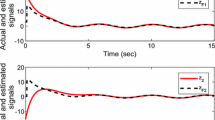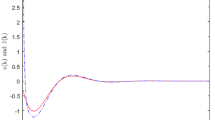Abstract
In this paper, we investigate the linear optimal estimation problems of discrete-time and continuous-time systems with multiple state delays in measurements. For discrete-time systems, we obtain the linear optimal estimation of state by direct calculation of optimal gain in terms of the solution to a retarded Riccati-like difference equation instead of a group of Riccati difference equations. For continuous-time systems, we also obtain the analytical expression of linear optimal estimation without resorting to Riccati partial differential equations. All the Riccati equations are of the same dimension as the system to be estimated and the computational cost is much saved. Infinite horizon case is also studied by stability analysis. Kalman filter can be recovered from our result when delays disappear. A numerical example is provided to demonstrate the results.
Similar content being viewed by others
References
W. Zhang, L. Yu, and G. Feng, “Optimal linear estimation for networked systems with communication constraints,” Automatica, vol. 47, no. 9, pp. 1992–2000, September 2011.
R. Kumar, “Novel multireceiver communication systems configurations based on optimal estimation theory,” IEEE Trans. on Communications, vol. 40, no. 11, pp. 1767–1780, November 1992.
D. B. Reid, W. S. Gesing, B. N. McWilliam, and J. E. Smyth, “Integration of multi-sensor navigation data using optimal estimation techniques,” Proc. of the 19th Conf. on Decision and Control, pp. 584–585, 1980.
W. You, G. Ma, and W. Zhang, “An optimal estimation method for multi-velocity vector integration in spacecraft celestial navigation,” Proc. of the 37th Chinese Control Conf., pp. 4798–4802, 2018.
X. Xiao, “The optimal filtering and algorithm analysis of random signal in the stochastic dynamic delivery system,” Proc. of the 10th International Conf. on Intelligent Computation Technology and Automation, pp. 282–286, 2017.
A. V. Korolev and A. M. Silaev, “Algorithm for optimal estimation of appearance times of pulsed signals in discrete time,” Radiophysics and Quantum Electronics, vol. 45, no. 3, pp. 230–238, March 2002.
K. Biswas and A. Mahalanabis, “Optimal smoothing for continuous-time systems with multiple time delays,” IEEE Trans. on Automatic Control, vol. 17, no. 4, pp. 572–574, August 1972.
J. Mishra and V. S. Wamani, “Least-squares state estimation in time-delay systems with colored observation noise: an innovations approach,” IEEE Trans. on Automatic Control, vol. 20, no. 1, pp. 140–142, February 1975.
X. Song and J. H. Park, “Linear optimal estimation for discrete-time measurement delay systems with multichannel multiplicative noise,” IEEE Trans. on Circuits and Systems, vol. 64, no. 2, pp. 156–160, February 2017.
H. Zhang, L. Xie, D. Zhang, and Y. C. Soh, “A reorganized innovation approach to linear estimation,” IEEE Trans. on Automatic Control, vol. 49, no. 10, pp. 1810–1814, October 2004.
H. Zhao, H. Zhang, C. Zhang, and X. Song, “Robust filtering and fixed-lag smoothing for linear uncertain systems with single delayed measurement,” Proc. of the 26th Chinese Control Conf., pp. 23–27, 2007.
K. M. Nagpal and R. Ravi, “H control and estimation problems with delayed measurements: state-space solutions,” SIAM Journal Control Optimal, vol. 35, no. 4, pp. 1217–1243, July 1997.
W. Zhang, M. X. Q. Chen, A. Liu, and S. Liu, “Aperiodic optimal linear estimation for networked systems with communication uncertainties,” IEEE Trans. on Cybernetics, vol. 47, no. 8, pp. 2256–2265, August 2017.
R. E. Kalman and R. S. Bucy, “New results in linear filtering and prediction theory,” Journal of Basic Engineering, vol. 83, pp. 95–108, March 1961.
H. Kwakernaak, “Optimal filtering in linear system with time delays,” IEEE Trans. on Automatic Control, vol. 12, no. 2, pp. 169–173, April 1967.
C. Han and H. Zhang, “Optimal estimation for continuous-time Markovian jump linear systems with delayed measurements,” International Journal of Control, Automation and Systems, vol. 7, no. 6, pp. 871–881, December 2009.
B. Jiang, Y. Kao, H. R. Karimi, and C. Gao, “Stability and stabilization for singular switching semi-Markovian jump systems With generally uncertain transition rates,” IEEE Trans. on Automatic Control, vol. 63, no. 11, pp. 3919–3926, November 2018.
H. R. Karimi, N. A. Duffie, and S. Dashkovskiy “Local capacity control for production networks of autonomous work systems with time-varying delays,” IEEE Trans. on Automation Science and Engineering, vol. 7, no. 4, pp. 849–857, October 2010.
E. Krouk, A. Sergeev, and M. Afanasev, “A transport coding gain estimation in the conditions of time limitation for maximum acceptable message delay,” Intelligent Decision Technologies, pp. 89–99, June 2019.
S. Lee and S. Jung, “Real-time inverse model estimation by a recursive least squares method for disturbance observer-based control systems: Balancing control of a single-wheel robot,” International Journal of Control, Automation and Systems, vol. 17, no. 8, pp. 1911–1920, May 2019.
M. A. Abooshahab, M. Ekramian, M. Ataei, and A. E. Boroojeny, “Time-delay estimationin state and output equations of nonlinear systems using optimal computational approach,” Journal of Optimization Theory and Applications, vol. 180, pp. 1036–1064, 2019.
H. Ren, R. Lu, J. Xiong, and Y. Xu, “Optimal estimation for discrete-time linear system with communication constraints and measurement quantization,” IEEE Trans. on Systems, Man, and Cybernetics: Systems, vol. 50, no. 5, pp. 1932–1942, May 2020.
Z. Fei, C. Guan, and P. Shi, “Reachable set estimation for discrete-time switched system with application to time-delay system,” International Journal of Robust and Nonlinear Control, vol. 28, no. 5, pp. 2468–2483, January 2018.
J. Xiao and F. Xu, “State bounding estimation for a linear continuous-time singular system with time-varying delay,” Advancesin Difference Equations, vol. 2019, no. 120, pp. 1–17, March 2019.
C. Li, C. Han, and F. He, “Distributed receding horizon estimation for discrete-time linear system with obserbation delays,” Proc. of the 37th Chinese Control Conf., pp. 1511–1516, 2018.
B. D. O. Anderson and J. B. Moore, Optimal Filtering, Englewood Cliffs, NJ: Prentice Hall, 1979.
S. Liu and L. Xie, “Linear optimal estimation of discrete-time systems with multiple measurement delays,” Proc. of the 36th Chinese Control Conf., pp. 1811–1816, 2017.
B. Keulen, H∞Control for Distributed Parameter Systems: A State Space Approach, Birkhäuser, 1993.
A. Bensoussan, G. D. Prato, M. C. Delfour, and S. K. Mitter, Representation and Control of Infinite Dimensional Systems, Verlag Basel, Switzerland: Birkhäauser, 2007.
Author information
Authors and Affiliations
Corresponding author
Additional information
Publisher’s Note Springer Nature remains neutral with regard to jurisdictional claims in published maps and institutional affiliations.
Recommended by Associate Editor DaeEun Kim under the direction of Editor Hamid Reza Karimi. This work is supported by the National Natural Science Foundation of China under Grants 61633014, U1701264, and the foundation for innovative research groups of National Natural Science Foundation of China (61821004).
Na-Na Jin received her B.E. and M.E. degrees in pure mathematics from School of Mathematical Sciences, University of Jinan, in 2014 and 2017, respectively. She is now working toward a Ph.D. degree in the School of Control Science and Engineering, Shandong University. Her research interests include optimal estimation and control, time-delay systems.
Shuai Liu received his B.E. and M.E. degrees in control theory and engineering from Shandong University in 2004 and 2007, respectively, and his Ph.D. degree in electrical and electronic engineering from Nanyang Technological University, Singapore, in 2012. He was a senior research fellow with Berkeley education alliance for research in Singapore (BEARS) from 2011 to 2017. Since 2017, he has been with the School of Control Science and Engineering, Shandong University, China. His research interests include optimal estimation and control, time-delay systems, fault detection and estimation.
Huan-Shui Zhang received his M.Sc. and Ph.D. degrees in control theory from Heilongjiang University, and Northeastern University, in 1991 and 1997, respectively. He worked as a postdoctoral fellow at Nanyang Technological University from 1998 to 2001 and as a Research Fellow at Hong Kong Polytechnic University from 2001 to 2003. He is currently a Changjiang Professorship at Shandong University. He was a Professor at the Harbin Institute of Technology from 2003 to 2006. He also held visiting appointments as a Research Scientist and Fellow with Nanyang Technological University, Curtin University of Technology, and Hong Kong City University from 2003 to 2006. His interests include optimal estimation and control, time-delay systems, stochastic systems, signal processing and wireless sensor networked systems.
Rights and permissions
About this article
Cite this article
Jin, NN., Liu, S. & Zhang, HS. Linear Optimal Estimation for Discrete-time and Continuous-time Systems with Multiple Measurement Delays. Int. J. Control Autom. Syst. 19, 1194–1204 (2021). https://doi.org/10.1007/s12555-020-0167-5
Received:
Revised:
Accepted:
Published:
Issue Date:
DOI: https://doi.org/10.1007/s12555-020-0167-5




